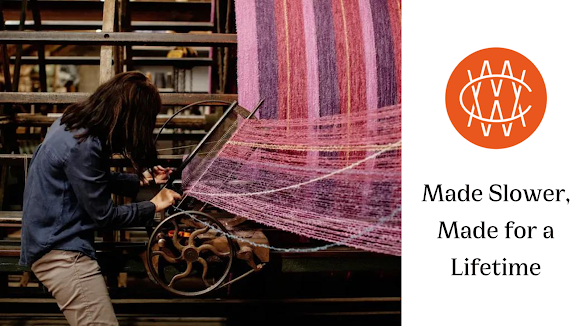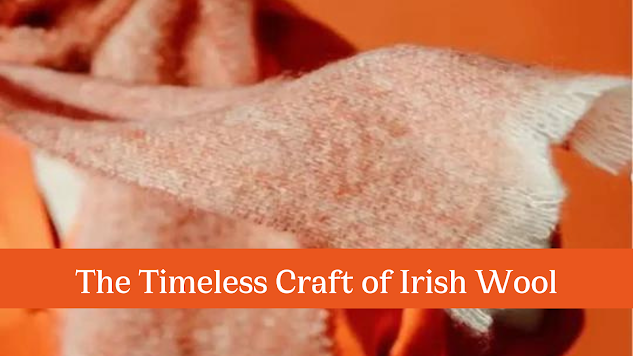The Role of Irish Woollen Mills in Promoting Ethical Trade Practices
Ireland's woollen mills are a symbol of tenacity, sustainability, and moral production and an important part of the nation's history. Cushendale Woollen Mills is a shining example of moral business practices among the well-known brands in this industry. The adoption of ethical and environmental practices by woollen mills around Ireland has solidified their position as pioneers in conscious commerce on the international stage.
This article explores Irish woollen mills' role in encouraging moral business practices, emphasizing their historical relevance, environmentally conscious projects, and dedication to environmental and community care.
Historical Significance of Irish Woollen Mills
Irish woollen mills have a long history and are deeply ingrained in the nation's economic and cultural landscape. These mills have historically served as community centers, creating jobs and maintaining traditional skills. To satisfy the needs of ethical and ecological trade, the sector today embraces modern processes while maintaining its deep roots in tradition.Commitment to Sustainability
Sustainability has been a top priority for Irish woollen mills, which are now integrating their operations with ethical trade norms. In this sector, sustainability frequently centers on:1. Locally Sourced Materials
Cushendale is one of many woollen mills that get their raw materials locally. By working with Irish sheep farmers, mills help local economies while lowering the carbon footprints associated with long-distance transportation. Irish sheep breeds, including Galway sheep, produce wool that is highly valued for its quality and helps to preserve biodiversity.2. Natural Dyeing Processes
Irish woollen factories are known for using natural dyes. For instance, Cushendale Woollen Mills uses eco-friendly dyeing methods that reduce waste from chemicals and water. These methods maintain ecological integrity while guaranteeing vivid, long-lasting hues.3. Waste Reduction
The biodegradable nature of wool makes it naturally sustainable, but Irish woollen mills go one step further by turning waste wool into mulch and insulation. The environmental impact is greatly decreased by this closed-loop method.Fair Trade and Ethical Labor Practices
People are the focus of ethical trade, not simply goods. Fair labor policies are a top priority for Irish woollen mills, guaranteeing that workers receive competitive pay, secure working conditions, and chances to advance their skills.Promoting Regional and Global Impact
Irish woollen mills have expanded their influence internationally and are now seen as emissaries of ethical trade. In foreign markets, their items are highly sought after since they are synonymous with quality and heritage. By adhering to moral principles, they establish a benchmark for international sectors.1. Showcasing Heritage Craftsmanship
Mills like Cushendale use venues like trade shows and internet markets to showcase the craftsmanship that goes into making wool products. Since these goods are genuine and sustainable, ethical buyers are drawn to them, preserving Irish workmanship for years to come.2. Education and Awareness
To raise awareness of ethical commerce, Irish woollen mills frequently collaborate with organizations and academic institutions. For example, they teach customers about the importance of slow fashion and sustainable choices by holding seminars, visits, and speeches.3. Collaborations with Designers and Brands
Numerous Irish woollen mills provide unique lines in partnership with designers and eco-friendly fashion labels. Through these collaborations, the mills reach a larger audience and spread the word about ethical trade.Challenges and the Way Forward
Irish woollen mills struggle to uphold moral business practices in spite of their achievements. Significant obstacles include shifting demand, rapid fashion competition, and rising production costs. However, mills like Cushendale have established a niche market that prioritizes authenticity over convenience by highlighting their dedication to quality, sustainability, and community.- Adopting Technology: Making use of contemporary instruments to improve productivity and lessen environmental effect without sacrificing conventional practices.
- Increasing Reach: Putting money into online channels to reach ethical customers throughout the world.
- Promoting Innovation: Creating new wool products and uses to be competitive in changing markets.
The Ethical Choice: Supporting Irish Woollen Mills
Customers view their choice of Irish woollen mills, such as Cushendale, as an investment in ethical and sustainable business operations rather than just a purchase. These mills stand for a dedication to environmental preservation, community empowerment, and heritage preservation.Whether it's a hand-knit scarf, a fitted coat, or a warm blanket, goods from Irish woollen mills are laden with history and the hope for a brighter future. Customers actively contribute to promoting ethical commerce and preserving the heritage of Irish handicrafts by patronizing these companies.
Conclusion
Irish woollen mills provide a model for industries around the world because of their long history and commitment to ethical trade. They establish a standard for ethical and responsible business practices while also conserving the craft of wool production by fusing traditional methods with contemporary environmental initiatives.Cushendale Woollen Mills and its contemporaries show that beautiful, high-quality items may be made while respecting the environment and the people who produce them. Irish woollen mills have never played a more important—or more inspirational—role in a time when ethical consumerism is becoming more popular.

.png)
.png)

Comments
Post a Comment